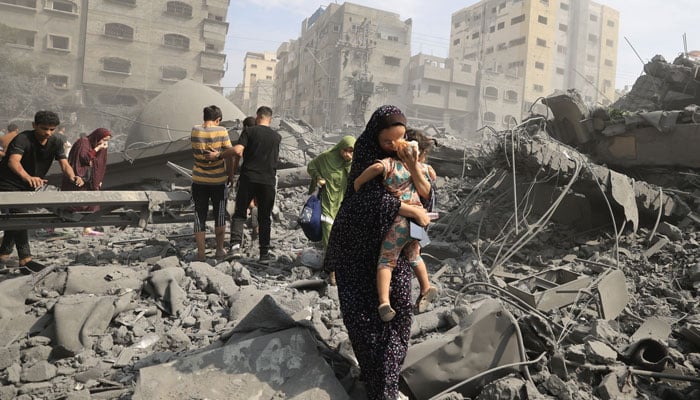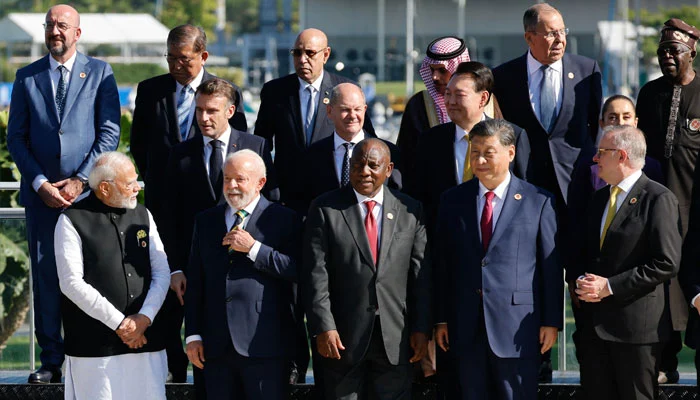After Israel imposed a complete blockade of Gaza in response to Hamas surprise attack, a humanitarian crisis is swiftly unfolding in Gaza with stranded residents facing a shortage of essential items, while the death toll from the clashes crossed 2,000.
The Gaza Strip has been hit by airstrikes since imposition of complete siege of the besieged territory with Israeli military fighter jets hit more than 200 targets overnight in a neighbourhood of Gaza City that it said had been used by Hamas to launch its unprecedented wave of attacks.
Under the “complete siege” on the area, the Israeli defence ministry said it halted supplies of electricity, food, water and fuel to the enclave.
The Palestinian interior ministry said most of the targets were “towers, residential buildings, civil and service facilities, and many mosques.” Hamas denied that it used any of the targeted towers.
Gaza’s health ministry said at least 900 people have been martyred and 4,600 wounded in the crowded coastal enclave.
On Saturday, Hamas gunmen from the Gaza Strip rampaged through parts of southern Israel, in the deadliest Palestinian attack in Israel’s history.
Israeli public broadcaster Kan reported the weekend death toll had reached 1,200.
Dozens of Israelis and other foreigners were captured and taken to Gaza as hostages, some shown on social media being paraded through the streets.
Hamas said the attack was in response to Israeli violations in the flashpoint Al-Aqsa Mosque complex in occupied East Jerusalem and increased settler violence.
‘Humanitarian crisis’
The United Nations Secretary General Antonio Guterres on Monday warned that the humanitarian situation in Gaza was already “extremely dire before these hostilities” and “now it will only deteriorate exponentially.”
Human Rights Watch (HRW) criticised Israel’s call for a complete siege as a form of “collective punishment” and a “war crime.”
The World Food Programme said Sunday that while most shops in the territory maintain “one-month stocks of food,” these stocks “risk being depleted swiftly as people stock up in fear of a prolonged conflict.” Repeated electricity cuts also risk food spoilage, it said.
The situation remains desperate for Nadine and her family.
“We have no water; it was cut off yesterday (Monday). We barely get electricity or internet, and we can’t leave the house to buy food as it’s getting more and more dangerous.” Whenever she hears aircraft, she said, “we hide under the table,” reported CNN.
‘White phosphorus bombs’
As the Israel-Hamas war entered its fifth day on Wednesday, Palestine has accused Israeli military of using white phosphorus bombs against civilians in the Karama neighborhood of Gaza Strip.
“The Israeli occupation is using internationally banned white phosphorus bombs against the Palestinians in the Karama neighborhood in northern Gaza,” the Foreign Ministry said on X, formerly Twitter on Tuesday.
Rami Abdo, the founder of the European Observatory for Human Rights, posted a video clip on the X platform of what he said was Israel’s use of phosphorus bombs.
“Israeli military forces are using toxic white phosphorus [bombs] on densely populated areas northwest of Gaza City,” he wrote.
The New York-based rights group Human Rights Watch had earlier cited reports of Israel’s use of white phosphorus bombs in Gaza during past conflicts, according to Anadolu.
The use of white phosphorus weapons to generate a smokescreen and cover troop movements is legally accepted, but the 1980 Geneva Convention forbids its use in densely populated areas.
There was no comment from Israel on the claim.
The Israeli military said dozens of its fighter jets struck more than 200 targets overnight in a neighbourhood of Gaza City that it said had been used by Hamas to launch its unprecedented wave of attacks.
Gaza’s health ministry said at least 900 people have been martyred and 4,600 wounded in the crowded coastal enclave.
On Saturday, Hamas gunmen from the Gaza Strip rampaged through parts of southern Israel, in the deadliest Palestinian attack in Israel’s history.
Israeli death toll rose to 1,200, according Israeli military spokesperson.
The victims were overwhelmingly civilians, gunned down in homes, on streets or at an outdoor dance party. Scores of Israelis and others from abroad were captured and taken to Gaza as hostages, some shown on social media being paraded through the streets.
Hamas said the attack was in response to Israeli violations in the flashpoint Al-Aqsa Mosque complex in occupied East Jerusalem and increased settler violence.
Over 260,000 people displaced in Gaza.
Over 260,000 people have been forced to flee their homes in the Gaza Strip, as heavy Israeli bombardments from the air, land and sea continue to hit the Palestinian enclave, the United Nations said.
“Over 263,934 people in Gaza are believed to have fled their homes,” said UN humanitarian agency OCHA said in an update Tuesday, warning that “this number is expected to rise further”.
It said that around 3,000 people had been displaced “due to previous escalations”, prior to Saturday.
The bombing campaign has destroyed more than 1,000 housing units, and 560 have been so severely damaged they are uninhabitable, OCHA said, citing Palestinian authorities.
Among the displaced, nearly 175,500 people sought shelter in 88 schools run by the UN agency supporting Palestinian refugees, UNRWA, it said.
More than 14,500 others had fled to 12 government schools, while close to 74,000 were estimated to be staying with relatives and neighbours or seeking shelters in churches and other facilities.
The number of displaced people inside of Gaza “represents the highest number of people displaced since the 50-day escalation of hostilities in 2014,” it said.
“Meeting basic needs is becoming increasingly challenging for those who have not been displaced,” OCHA warned.
Israel has imposed what it called a “complete siege” on the already blockaded Gaza Strip, cutting off food, water, fuel and electricity — a move that UN Secretary-General Antonio Guterres warned would worsen an already dire humanitarian situation.
Airstrike on Hamas commander’s home
According to Israeli media reports, Israeli military launched an airstrike on the home of relatives of Mohammad Deif, the Hamas military commander, in a Qizan an Najjar neighborhood in Khan Younis, a southern city in the Gaza Strip.
Citing Palestinian reports, a number of Hebrew media say Deif’s father, brother, his son, and the brother’s granddaughter were martyred in the attack.
According to Al Mayadeen, an unknown number of relatives were in the home in Khan Younis and were trapped in the rubble.
14 Americans killed
In a speech on Tuesday Biden confirmed at least 14 Americans were killed, and others were missing.
The US has sent an aircraft carrier and other warships to the eastern Mediterranean as part of efforts to deter an expansion of the conflict, and is also providing other assistance, including sharing intelligence with Israel.
Relatives of Americans believed held in Gaza called on the Biden administration to bring them home safely.
Western powers and many other nations have reported citizens killed, abducted or missing. These include: Brazil, Cambodia, Canada, Ireland, Mexico, Nepal, Panama, Paraguay, Russia, Sri Lanka, Thailand and Ukraine.
Hamas has held around 150 captives since its ground incursion, among them children, elderly and young people captured at a music festival where around 270 died.
On Monday, Hamas warned it would start killing hostages every time Israel launches a strike on a civilian target in Gaza without warning. French President Emmanuel Macron called the threat “unacceptable blackmail.”
Fear and chaos reigned among the 2.3 million Palestinians living in the coastal territory that has been hammered by thousands of Israeli munitions.
Hamas said the strikes killed two of its senior figures: Zakaria Muammar led its economics section, and Jawad Abu Shamala coordinated ties with other Palestinian factions.
Israel´s army also announced their deaths.
Four Palestinian journalists were also killed in Israeli air strikes on Gaza City, media unions and officials said.
EU opposes complete siege
Israel on Monday imposed a total siege on Gaza, which it has already blockaded for years, cutting off the water supply, food, electricity and other essential supplies.
European Union foreign ministers urged Israel not to cut such essentials, and called for humanitarian corridors for those trying to flee.
UN human rights chief Volker Turk said such sieges are prohibited under international humanitarian law.
Medical supplies, including oxygen, were running low at Gaza´s overwhelmed Al-Shifa hospital, said Mohammed Ghonim, a doctor in the emergency room.
Israel reeling from surprise attack
Israel has been left reeling by Hamas´s unprecedented ground, air and sea assault that began with thousands of rockets, likening it to the 9/11 attacks on the US.
In the aftermath, soldiers who were on guard duty along the hi-tech security barrier around Gaza recounted how the attack began with an effort to cripple observation cameras and communications.
“They took us by surprise and we weren´t ready for it,” a lookout soldier said in testimony posted on Instagram.
Israel faced the threat of a multi-front war after three days of clashes with militants on the northern border with Lebanon.
For the first time since the Hamas attack, there was an exchange of fire between Israel and forces in Syria, after Israel´s military said munitions were fired towards the Golan Heights it has occupied since 1967.
Mourners in the southern Lebanese village of Khirbet Selm carried two caskets, draped in yellow Hezbollah flags, with the bodies of two fighters it said were killed in Israeli strikes a day earlier. A third fighter was also killed, the Iran-backed Hezbollah movement said.
On Tuesday, the Ezzedine al-Qassam Brigades claimed a fresh salvo of rocket fire from south Lebanon towards Israel, the Israeli army said, adding it retaliated with artillery fire.
“It´s like a state of war,” said Yaakov Regev, sipping coffee at a petrol station in northern Israel, a few kilometres from the Lebanon border.
Unrest has also surged in the West Bank, where 15 Palestinians have been martyred since Saturday.
Netanyahu, the veteran leader at the helm of Israel´s hard-right coalition, has called for an “emergency government of national unity” after his administration´s proposal for judicial reforms split the nation and even its military this year, before the war brought the nation closer together.



